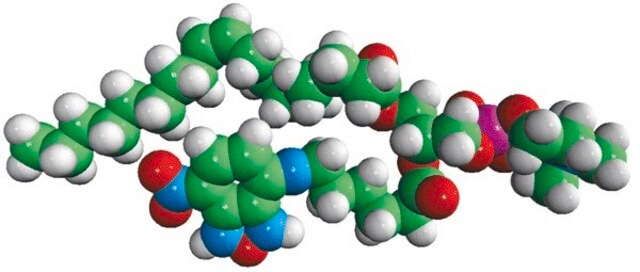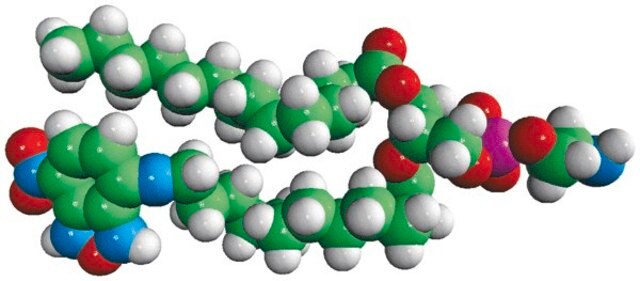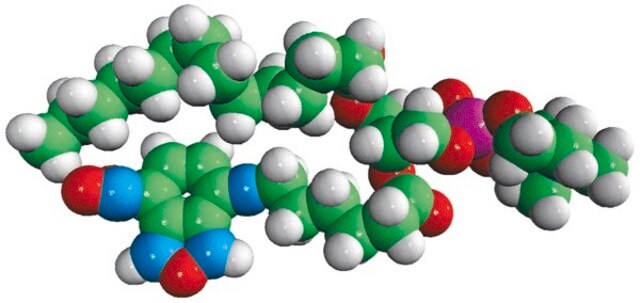810132P
Avanti
18:1-06:0 NBD PC
Avanti Research™ - A Croda Brand
Synonym(s):
1-oleoyl-2-{6-[(7-nitro-2-1,3-benzoxadiazol-4-yl)amino]hexanoyl}-sn-glycero-3-phosphocholine
Sign Into View Organizational & Contract Pricing
All Photos(2)
About This Item
Empirical Formula (Hill Notation):
C38H64N5O11P
CAS Number:
Molecular Weight:
797.92
UNSPSC Code:
12352211
NACRES:
NA.25
Recommended Products
Assay
>99% (TLC)
form
powder
packaging
pkg of 1 × 1 mg (810132P-1mg)
pkg of 5 × 1 mg (810132P-5mg)
pkg of 5 × 2 mg (810132P-10mg)
manufacturer/tradename
Avanti Research™ - A Croda Brand
shipped in
dry ice
storage temp.
−20°C
General description
Phosphatidylcholine (PC) is a prime metabolite of glycerolipid metabolism in eukaryotes. It is a vital component of the mucosal layer of the colon and a strong bilayer-forming lipid. NBD PC has 7-nitrobenz-2-oxa-1,3-diazol-4-yl (NBD) moiety attached to phosphatidylcholine.
Application
18:1-06:0 NBD PC is suitable:
- for the generation of giant unilamellar vesicles (GUVs) subjected to fluorescence microscopy
- for labeling lipid bilayers formed by vesicle fusion in order to study the lipid distribution by fluorescence microscopy
- for the preparation of phospholipid-coated beads
Biochem/physiol Actions
7-nitrobenz-2-oxa-1,3-diazol-4-yl phosphatidylcholine (NBD PC) is used as a fluorescent probe in biological membranes to study the cellular processes.
Packaging
5 mL Amber Glass Screw Cap Vial (810132P-10mg)
5 mL Amber Glass Screw Cap Vial (810132P-1mg)
5 mL Amber Glass Screw Cap Vial (810132P-5mg)
Legal Information
Avanti Research is a trademark of Avanti Polar Lipids, LLC
Storage Class Code
11 - Combustible Solids
Certificates of Analysis (COA)
Search for Certificates of Analysis (COA) by entering the products Lot/Batch Number. Lot and Batch Numbers can be found on a product’s label following the words ‘Lot’ or ‘Batch’.
Already Own This Product?
Find documentation for the products that you have recently purchased in the Document Library.
Yuta Ryoden et al.
Journal of immunology (Baltimore, Md. : 1950), 204(3), 559-568 (2019-12-22)
In response to extracellular ATP, the purinergic receptor P2X7 mediates various biological processes, including phosphatidylserine (PtdSer) exposure, phospholipid scrambling, dye uptake, ion transport, and IL-1β production. A genome-wide CRISPR screen for molecules responsible for ATP-induced PtdSer exposure identified a transmembrane
Henry A Boumann et al.
Biochimica et biophysica acta, 1788(7), 1444-1451 (2009-04-21)
Anammox bacteria that are capable of anaerobically oxidizing ammonium (anammox) with nitrite to nitrogen gas produce unique membrane phospholipids that comprise hydrocarbon chains with three or five linearly condensed cyclobutane rings. To gain insight into the biophysical properties of these
Sang-Yeob Kim et al.
PloS one, 12(4), e0174603-e0174603 (2017-04-05)
The removal of unwanted or damaged cells by phagocytes is achieved via a finely regulated cleaning process called efferocytosis. To characterize the mechanisms through which phagocytes control the intake of apoptotic cells, we investigated how the phagocyte's appetite for engulfed
Wan-Chen Lin et al.
Biophysical journal, 90(1), 228-237 (2005-10-11)
A fundamental attribute of cell membranes is transmembrane asymmetry, specifically the formation of ordered phase domains in one leaflet that are compositionally different from the opposing leaflet of the bilayer. Using model membrane systems, many previous studies have demonstrated the
Johan Tornmalm et al.
Scientific reports, 9(1), 18133-18133 (2019-12-04)
Protein-lipid interactions in cellular membranes modulate central cellular functions, are often transient in character, but occur too intermittently to be readily observable. We introduce transient state imaging (TRAST), combining sensitive fluorescence detection of fluorophore markers with monitoring of their dark
Our team of scientists has experience in all areas of research including Life Science, Material Science, Chemical Synthesis, Chromatography, Analytical and many others.
Contact Technical Service








